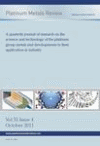-
oa The +IV Oxidation State in Organopalladium Chemistry
Recent Advances and Potential Intermediates in Organic Synthesis and Catalysis
- Source: Platinum Metals Review, Volume 37, Issue 1, Jan 1993, p. 2 - 7
-
- 01 Jan 1993
Abstract
The organometallic chemistry of palladium is dominated by the +II oxidation state, and the chemistry of complexes containing simple organic groups bonded to palladium in the +IV oxidation state has developed only recently. Organic synthesis and catalytic reactions that may involve undetected palladium(IV) intermediates have been suggested frequently, and the new oxidation state +IV chemistry provides some support for these proposals, and gives encouragement for the development of new systems involving palladium(IV). The chemistry of organopalladium(IV) is reviewed here, and possible catalytic roles forpalladium(IV) are discussed. The synthesis and decomposition reactions of palladium(IV) complexes provide “models” for catalytic proposals. The palladium(IV) complexes are formed by oxidative addition of organohalides to palladium(II) complexes, and most complexes decompose under mild conditions by carbon-carbon bond formation in reductive elimination reactions, for example, for methyl(pheny1) (2,2’-bipyridyl)palladium(II) as a substrate, oxidative addition of benzyl bromide gives PdIV BrMePh(CH2Ph) (bpy), which reductively eliminates toluene to form the complex PdIIBr(CH2Ph)(bpy).


